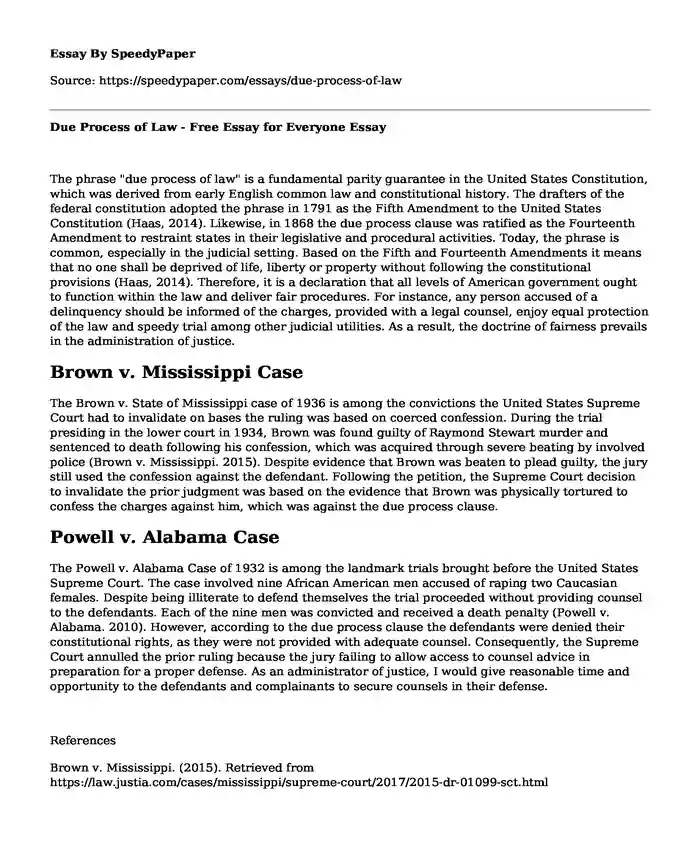
| Type of paper: | Essay |
| Categories: | Law Constitution |
| Pages: | 2 |
| Wordcount: | 468 words |
The phrase "due process of law" is a fundamental parity guarantee in the United States Constitution, which was derived from early English common law and constitutional history. The drafters of the federal constitution adopted the phrase in 1791 as the Fifth Amendment to the United States Constitution (Haas, 2014). Likewise, in 1868 the due process clause was ratified as the Fourteenth Amendment to restraint states in their legislative and procedural activities. Today, the phrase is common, especially in the judicial setting. Based on the Fifth and Fourteenth Amendments it means that no one shall be deprived of life, liberty or property without following the constitutional provisions (Haas, 2014). Therefore, it is a declaration that all levels of American government ought to function within the law and deliver fair procedures. For instance, any person accused of a delinquency should be informed of the charges, provided with a legal counsel, enjoy equal protection of the law and speedy trial among other judicial utilities. As a result, the doctrine of fairness prevails in the administration of justice.
Brown v. Mississippi Case
The Brown v. State of Mississippi case of 1936 is among the convictions the United States Supreme Court had to invalidate on bases the ruling was based on coerced confession. During the trial presiding in the lower court in 1934, Brown was found guilty of Raymond Stewart murder and sentenced to death following his confession, which was acquired through severe beating by involved police (Brown v. Mississippi. 2015). Despite evidence that Brown was beaten to plead guilty, the jury still used the confession against the defendant. Following the petition, the Supreme Court decision to invalidate the prior judgment was based on the evidence that Brown was physically tortured to confess the charges against him, which was against the due process clause.
Powell v. Alabama Case
The Powell v. Alabama Case of 1932 is among the landmark trials brought before the United States Supreme Court. The case involved nine African American men accused of raping two Caucasian females. Despite being illiterate to defend themselves the trial proceeded without providing counsel to the defendants. Each of the nine men was convicted and received a death penalty (Powell v. Alabama. 2010). However, according to the due process clause the defendants were denied their constitutional rights, as they were not provided with adequate counsel. Consequently, the Supreme Court annulled the prior ruling because the jury failing to allow access to counsel advice in preparation for a proper defense. As an administrator of justice, I would give reasonable time and opportunity to the defendants and complainants to secure counsels in their defense.
References
Brown v. Mississippi. (2015). Retrieved from https://law.justia.com/cases/mississippi/supreme-court/2017/2015-dr-01099-sct.html
Haas, K. (2014). Confession | law. Retrieved from https://www.britannica.com/topic/confession-law#ref1202104
Powell v. Alabama. (2010). Retrieved from https://deathpenalty.procon.org/sourcefiles/PowellvAlabama.pdf
Cite this page
Due Process of Law - Free Essay for Everyone. (2022, Jun 20). Retrieved from https://speedypaper.net/essays/due-process-of-law
Request Removal
If you are the original author of this essay and no longer wish to have it published on the SpeedyPaper website, please click below to request its removal:
- Ethical Autobiography Essay Sample
- Free Essay Example about Insomnia
- Free Essay: Influence of Native American Religions on the Religiosity of New World Settlers
- HR Management Essay Sample: Meadowbrook Golf and Golf Ventures West Case Analysis
- Frankenstein Narrative in a Free Essay Example
- Essay Sample: How English Course Has Affected My Academics
- Expository Essay Sample on Mark Twain
Popular categories




